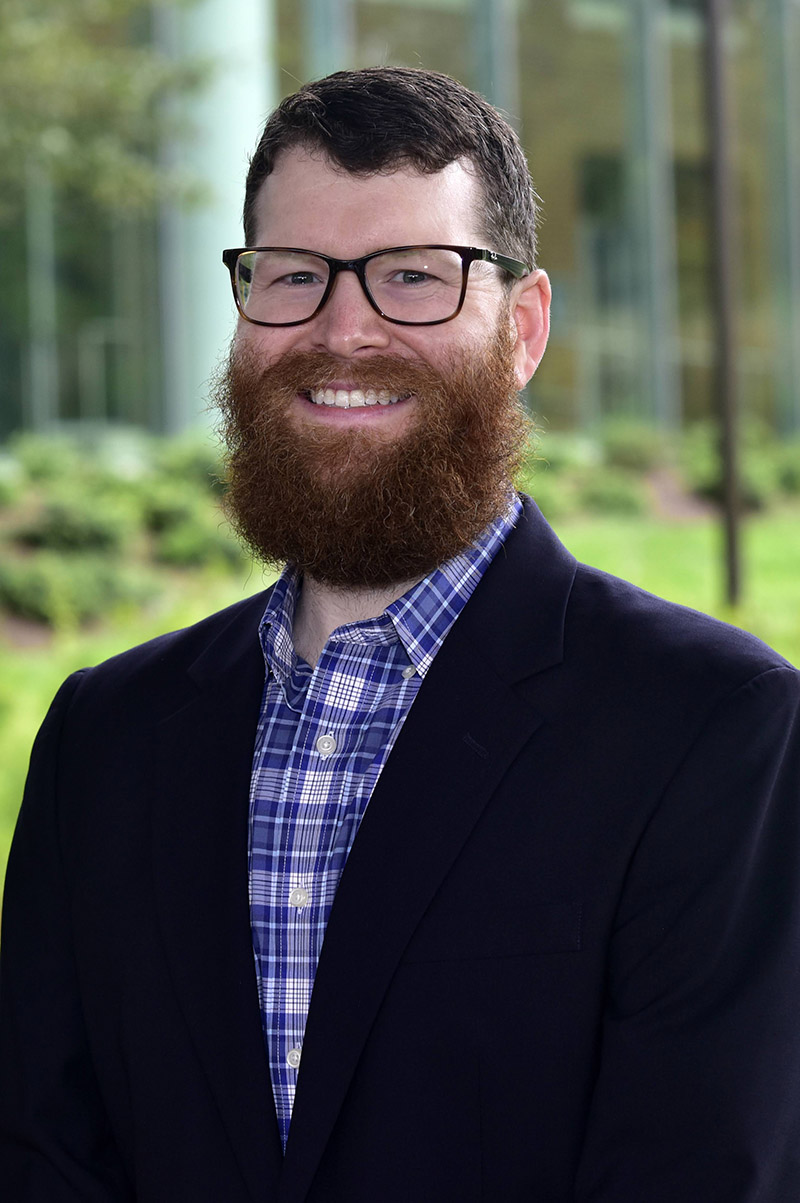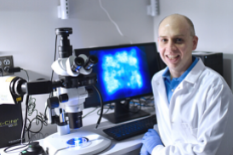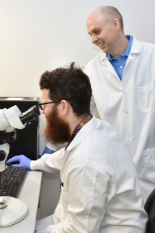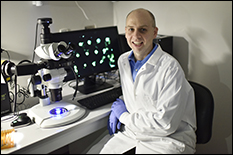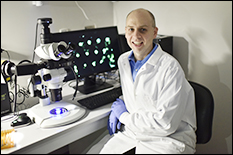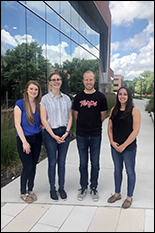News Story
Jewell Leads Team in Advancing Multiple Sclerosis Research
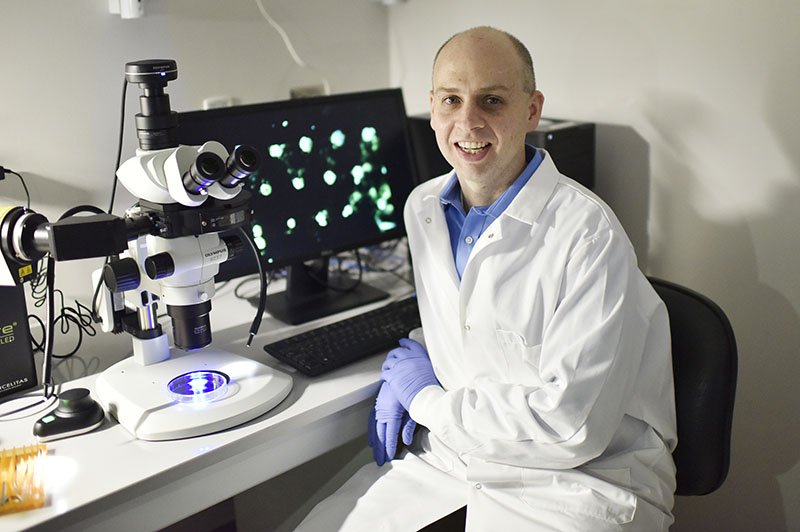
Fischell Department of Bioengineering Professor Christopher Jewell
University of Maryland Fischell Department of Bioengineering Professor Christopher Jewell was awarded a five-year, $2.8 million National Institutes of Health grant to develop new biomaterial-based approaches for therapeutic vaccines aimed at combating multiple sclerosis (MS) and other autoimmune disorders. His research team includes personnel from the University of Maryland, Baltimore School of Medicine, as well as Fischell Department of Bioengineering (BIOE) researchers at the University of Maryland, College Park.
Nearly 2.5 million people worldwide have been diagnosed with MS, an autoimmune disease that causes the body’s immune system to wrongfully attack myelin, the insulation that surrounds and protects nerve fibers in the brain and spinal cord. When this happens, nerve fibers and cells are damaged, leading to a loss of motor function and other neurological complications that greatly impact the patient’s quality of life.
Current therapies for MS are not curative, but are focused on slowing disease. Further, these options act nonspecifically to decrease the activity of the immune system to restrain the detrimental “attack” inflicted by MS, but this comes at a cost that leaves patients vulnerable to certain infections or illnesses, including some cancers. Recognizing this, Jewell and his team are working to find new ways to efficiently prevent the immune system from attacking healthy tissue without immune-suppresive side effects.
Combining Immunological Approaches
In the human body, the immune system detects antigens – molecules that are present on all cells and vary according to the type of cell – in order to distinguish the body’s own “self cells” from foreign cells and pathogens. When functioning properly, the body’s immune system recognizes self cells by their self-antigens. This, in turn, means that foreign substances — such as bacteria, toxins, or viruses — stick out like a sore thumb, enabling the immune system to wage a specific attack to eliminate the intruder.
Even though the arsenal of MS therapies available today include newer treatments such as monoclonal antibodies, these newest options still cannot distinguish between healthy cells and the dysfunctional immune cells attacking the body.
Recognizing this, Jewell and his collaborators have been working to engineer a platform that could selectively control autoimmune reactions by controlling how immune signals are processed. Together, his team developed a technique to inject controlled-release biomaterial depots directly into the lymph nodes, the tissues that coordinate the body’s immune response. The group’s specially designed depots are too large to drain out of nodes. Instead, these depots – loaded with a myelin peptide and an immunoregulatory drug to retrain the response to myelin – locally condition the lymph node environment for tolerance. The goal is to teach existing myelin-reactive cells to adopt a protective regulatory function, instead of a dangerous inflammatory function.
In a sense, they are using the lymph node as a factory to make specialized regulatory T cells. These cells are a special kind of immune cells that can more specifically control the existing self-reactive inflammatory cells. Further, these cells are also capable of adopting “memory-like" functions that could contribute to long-lasting tolerance. Using the lymph node to make these cells without exposing the entire host also creates the potential of far fewer side effects because only a small dose is delivered directly to the local lymph node site. By retraining myelin-specific T cells to become regulatory T cells with this technology, Jewell and his team hope they can direct the immune system to “remember” to fight the disease long after treatment.
"Direct lymph node delivery is a unique tool to probe immune function because we can control the specific combinations and relative levels of signals in the lymph node,” Jewell said. “Additionally, since these tissues are locations where immune cells develop, controlling the local environment provides a new route to direct how immune cells develop – toward regulatory T cells, for example – that can then migrate out of the node into the body to selectively control disease.”
Encouraging Findings
So far, the team’s results are promising. Preliminary data in mice have demonstrated that a single dose of the specially designed biomaterial depots reverses disease-induced paralysis in a key model of MS. Excitingly, these effects occur even when the biomaterial depots are administered at the peak of disease, confirming the power of this system to serve as a tool to locally control the function of one lymph node, while dissecting the impact on systemic tolerance – including at distant sites such as the central nervous system and spleen.
“We’re so excited to receive this new support from the NIH National Institute of Allergy and Infectious Diseases,” Jewell said. “MS is a terrible disease, despite all the existing treatments, so everyone on our team is super motivated to push this effort forward. Hopefully our work – with support of the NIAID, the NIH National Institute of Biomedical Imaging and Bioengineering Concept-to-Clinic program, and the Maryland Innovation Initiative – will contribute new insight into designing treatments for MS or other autoimmune diseases that are effective, lasting, and safe.”
To advance their research, Jewell and members of his lab are working with University of Maryland School of Medicine Professor of Surgery Jonathan Bromberg, M.D., Ph.D., and members of Bromberg’s lab to conduct further analysis of lymph nodes, spleens, and the central nervous system before and after treatment.
Moving forward, the team hopes their strategy could contribute to new biomaterial-based approaches for therapeutic vaccines aimed at combating autoimmune disorders.
Jewell holds BIOE appointments as Minta Martin Professor of Engineering and University of Maryland MPower Professor, as well as an appointment in the Microbiology and Immunology Department at the University of Maryland Medical School. He is also a Research Health Scientist with the U.S. Department of Veterans Affairs, and a Fischell Institute Fellow in the University of Maryland’s Robert E. Fischell Institute for Biomedical Devices.
In addition to serving as Professor of Surgery with the University of Maryland School of Medicine, Bromberg holds appointments as Vice Chair for Research and Professor of Microbiology and Immunology.
Research reported in this publication was supported by the National Institute of Allergy and Infectious Diseases of the National Institutes of Health under award number R01AI169686 and National Institutes of Biomedical Imaging and Bioengineering award number R01EB026896. The content is solely the responsibility of the authors and does not necessarily represent the official views of the National Institutes of Health.
A History of Success
In addition to the NIH R01 grant, Jewell’s lab was also recently selected for funding of an additional $2.2 million in awards from the U.S. Department of Veterans Affairs Biomedical Laboratory Research & Development (BLRD).
Jewell’s lab is currently supported by $13.2 million in active funding, including six NIH R01 and VA I01/IK21 awards. His group’s funded projects span materials innovation, preclinical research, translational activities, new model development, and in silico research.
Published July 15, 2022


